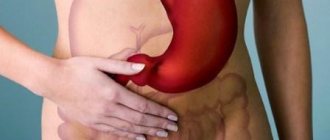Beneficial features
Before answering the question of whether an adult or child can drink kefir if they have diarrhea, you need to understand how it works and how this product is useful for the human body.
Kefir is a fermented milk product that is obtained by fermenting milk with the help of special lactic acid bacteria and fungi. Bifidobacteria, lactobacilli, lactic acid fungi and other beneficial microorganisms “live” in the leaven. Once in milk, they begin to actively multiply, colonizing and at the same time fermenting it. The result of this interaction is a product containing a huge number of living beneficial bacteria capable of colonizing and multiplying in the intestines.
Like other dairy products, kefir contains a lot of lactose, but most importantly, it contains a large number of beneficial bacteria, as well as protein and vitamins.
Effect on the body during diarrhea
Kefir is not always useful for diarrhea. Whether to drink it or not is decided by the doctor, who can determine the cause of the bowel disorder, or if you can say exactly why the diarrhea began.
Diarrhea, or diarrhea, is a functional disorder of the digestive system that occurs due to inflammation of the intestinal mucosa when poor-quality food or pathogenic bacteria enter it. Due to inflammation and intoxication, the intestines cannot digest food normally, stops absorbing nutrients, and the process of food evacuation is disrupted. This leads to more frequent bowel movements, loose stools, cramping and abdominal pain.
In this case, the answer to the question “is it possible to drink kefir with diarrhea” will be positive.
Less commonly, indigestion is caused by helminthiasis, allergies or intestinal dysbiosis. With such diseases, the advisability of taking any food in each specific case is analyzed individually, especially in childhood.
In case of acute inflammation, doctors recommend abstaining from food completely - it will only irritate the mucous membrane and will not bring any benefit. But after the clinical symptoms disappear, you can try introducing fermented milk products into the diet, for example, yogurt or matsoni.
Once in the gastrointestinal tract, they have a positive effect in several directions at once:
- colonize the intestines with lacto- and bifidobacteria;
- reduce irritation of the intestinal mucosa;
- saturate the body with proteins, lactose and vitamins;
- enhance the production of immunoglobulins in the intestines.
Is it possible to cure diarrhea with kefir alone?
Lactic acid bacteria reduce the degree of intoxication, improve well-being, and replenish the lack of useful elements that are lost due to dehydration. Kefir consists of 74% water, therefore, first of all, it fights fluid loss during diarrhea and maintains water-salt balance. But the drink is not effective as the only method of treatment, except in cases of frequent bowel movements (not diarrhea) or constipation.
To get rid of the symptom, additional therapy is needed to combat dehydration and intoxication. Sorbents are prescribed that absorb and remove harmful bacteria from the body. Kefir helps in the complex therapy of non-bacterial diarrhea.
Instructions for using kefir for diarrhea
For diarrhea, only fresh, natural kefir will be useful, without any additives, preservatives or dyes.
In any case, preference should be given to a fresh, recently fermented product, the shelf life of which should not exceed 7 days, and better - no more than 3. It should contain only milk and sourdough, no preservatives, additives or flavor enhancers. If you cannot purchase fresh kefir or you doubt its beneficial qualities, the drink can be easily prepared at home.
There are many recipes, but if you are going to drink kefir for an upset stomach, choose the simplest ones:
- With “old” kefir – to prepare the drink you need 50 ml of kefir and fresh, warm milk, about 500 ml. Add starter to warm milk, mix thoroughly and leave in a dark, warm place for 8-12 hours. Then mix again and leave for another 10 hours. After this, the drink is ready.
- With sour cream - add 100-150 grams of fatty (at least 20%) sour cream to 1 liter of milk. Sour cream is added to warm milk, mixed thoroughly and left in a dark place at room temperature (or a little warmer) for 10-12 hours. After this, the drink is stirred again and the readiness is assessed by taste.
- With bifidobacteria - to increase the concentration of beneficial microorganisms during preparation, add 1 bottle or 5 servings of Bifidumbacterin to the drink. 60 g of sour cream is mixed with Bifidumbacterin, 200 ml of heated milk and left in a warm place for 3-4 hours. The resulting starter is added to milk at the rate of 150 ml per 1 liter of milk and left for another 12 hours. After the expiration of the period, mix; the drink is ready.
Important! When cooking, do not close the container with a tight lid: during fermentation, gases are released that will accumulate and can spoil the finished product or “explode” the container. It is recommended to cover the dishes with gauze folded in several layers or a thin cloth.
How to drink kefir correctly for diarrhea:
- After the symptoms of acute poisoning disappear.
- Only a fresh drink is suitable for consumption, without thickeners or preservatives.
- An adult is recommended to drink 2-4 glasses of kefir per day before meals.
- You can limit yourself to one kefir for 2-3 days, without eating other foods.
You can give kefir to a child with diarrhea only after consulting with your doctor and determining the cause of the disease. It is especially important to follow this rule for diarrhea in children under 3 years of age.
Advantages and disadvantages
The main component of kefir is fungi (symbiotic ferment), rich in beneficial microorganisms, minerals, and vitamins. The product does not eliminate the symptom of diarrhea, but normalizes intestinal function, restoring the microflora. For diarrhea, use only fresh, fatty kefir (from 2.5%), no more than 400 mg per day. The higher the fat content, the greater the production of lactose, which stimulates the intestines to undergo significant contractions and restores the pH acidity of the environment (>5.5).
pros
- product composition – proteins (2.9%), choline, beta-carotene, nicotinic and ascorbic acids, B vitamins, minerals;
- replenishes the lack of fluid;
- eliminates the feeling of hunger;
- inhibits the development of pathogenic microorganisms;
- removes waste, toxins and decay products;
- restores irritated areas of the intestinal mucosa;
- stimulates cell regeneration;
- normalizes the balance of bacteria in the body.
To the question: is kefir for diarrhea possible or not, gastroenterologists answer “yes”, the product will speed up the body’s recovery process. In the complex therapy of diarrhea, only fresh kefir is used, preferably homemade, with a sour (not tart) odor. Often recommended for pregnant women at the stage of toxicosis.
Despite the benefits of the product, use during diarrhea is, in some cases, harmful. For example, kefir with a fat content of up to 1.5% will increase the acidity of the intestinal flora and create a favorable environment for the spread of pathogenic organisms.
The result is a complication of the disease due to intestinal infections and food poisoning.
Negative impact
- with an allergy to lactose (more often in children under 3 years of age);
- for intestinal infections;
- for stomach diseases, including ulcers;
- low level of acidity in the gastrointestinal tract.
Consumption of the product for gastrointestinal acidity disorders will intensify symptoms, since the acidic environment will have an aggressive effect on the mucous membranes of the organs. The result is worsening diarrhea, pain, and abdominal cramps.
In Russia, diagnoses related to gastroenterology cover 86% of the adult population. Therefore, when deciding to treat diarrhea with lactic acid bacteria, you should consult your doctor for contraindications.
Contraindications
You can’t always drink kefir for diarrhea in children and adults. There are certain contraindications to its use:
- Chronic diseases of the gastrointestinal tract - with chronic gastritis, colitis or cholecystitis, the acidity of the stomach contents may be impaired, and the intestinal mucosa may be severely inflamed. Taking kefir for such diseases can worsen the condition, provoke attacks of pain, heartburn, or increase diarrhea. In case of chronic diarrhea caused by gastrointestinal diseases, the diet should be prepared by a doctor, and you should not drink anything without his recommendation.
- The age of the child is less than 8-12 months - kefir is introduced into the baby's complementary feeding starting from 8-10 months, but in case of diarrhea, this drink should not be given to children under one year old. They do not yet have all the digestive enzymes, and kefir can irritate the mucous membrane and not be digested.
- Lactose or casein intolerance - kefir contains both of these substances, so it can cause an allergic reaction in such patients and aggravate the painful condition.
You should not give kefir for diarrhea to a child or adult if the symptoms of the disease began after consuming this product. Perhaps the cause of diarrhea was a “fermented” or stale drink, and repeated consumption of even high-quality kefir will only intensify the symptoms of the disease.
Why does diarrhea appear, causes of diarrhea
Loose stools and diarrhea start under the influence of a number of factors: infectious and viral diseases (including influenza and ARVI), food poisoning and toxic substances, antibiotic treatment, unbalanced diet, lack of routine, overeating, alcohol consumption, emotional stress, stress, diseases of the liver, pancreas and kidneys, allergic reactions, lactose intolerance, cancer.
Treatment aimed at eliminating diarrhea includes the use of medications and a mandatory diet. Depending on the reasons for the appearance of loose stools, the consumption of fermented milk products may or may not be acceptable. Below we look at how different lactic acid foods affect the digestive system and whether they can be eaten during diarrhea.
Recommendations
Kefir is a highly perishable dairy product, so it is important to pay special attention to its shelf life and appearance.
It can be stored fresh in the refrigerator, closed for no more than 7 days, and opened for no more than a day. If you store it longer, it will “ferment”, lactic acid fungi will begin to actively multiply in it, and lactic acid will accumulate, which is harmful to the stomach and intestines. Such kefir can cause diarrhea or cause poisoning.
Improper storage, excess or lack of starter can lead to the fact that even recently prepared kefir will be unsuitable for consumption. This can be assessed by its appearance, smell and taste.
A high-quality, fresh drink is a white or milky-white drink, with a pleasant, mild odor, and a slightly sour taste. It should not contain foreign impurities, sweetish or bitter taste. You should not drink kefir that is too thick or a drink in which the whey separates from the rest. Of course, you should not consume a product with mold or a rotting smell.
You need to be especially careful when children eat kefir. If the stomach of an adult is able to cope with a slightly “overstayed” product, then in children such a drink will cause stool upset. It is recommended to give young children only fresh kefir, no more than 3 days of storage, and for schoolchildren the best choice would be a homemade drink or “sour milk” without any impurities, additives or fillers.
Application for a child
To produce kefir, a mixed fermentation technique is used, with the formation of C2H5OH from milk sugar. 3 days after production, the concentration of ethyl alcohol is 0.6%. For an adult body, the dose is insignificant and is processed without residual effects. If the child’s gastrointestinal tract is not strong enough, a fermented milk drink can cause intoxication, so consumption of the product is not recommended for children under 1 year of age.
Homemade kefir is recommended for the treatment of childhood diarrhea. For quick preparation, you can use a slow cooker or yogurt maker.
Recipe
- 0.5 l of milk;
- 50 ml of pharmaceutical starter (Narine, bifidobacteria);
- 1 tsp sugar.
Warm the milk (do not bring to a boil), pour in the starter, stir in the sugar. Without pouring, remove the container, close the lid, and wrap with a warm towel. Leave for storage in a dark place, at room temperature, for 12-18 hours. The shelf life of the finished product is 2 days.
Rules of use
- Do not give kefir if the diarrhea is watery or foamy.
- Start taking it 24 hours after the first loose stool.
- Dosage – 150 ml per day, 1/3 glass in the morning and evening.
- The complex includes plenty of fluids and sorbents.
Mixed fermentation products for diarrhea in a child are not the best method of therapy. Only in 5% of cases are they recommended as part of the main treatment complex (enzymes, lacto- and bifidobacteria, absorbent drugs).
Diarrhea is a symptom of a disorder in body functions. Self-prescribing medications without diagnosing the cause is useless and dangerous. The use of kefir is justified for the prevention of gastrointestinal disorders, but for the treatment of diarrhea, medicinal methods are preferable.
In case of intestinal dysfunction, the most important condition for recovery is diet. If you have diarrhea at the time of illness and after it, it is recommended to eat fermented milk products. But is it possible to drink kefir if you have diarrhea, or should you completely give up any food?











